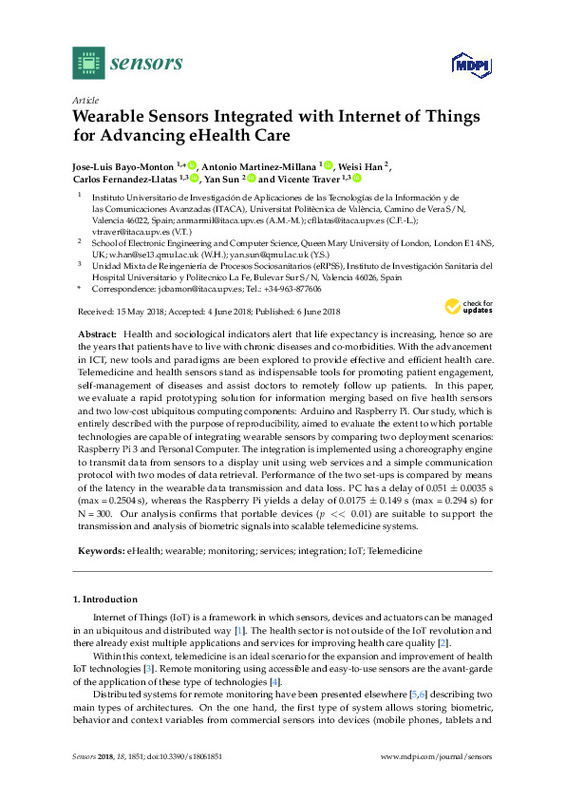JavaScript is disabled for your browser. Some features of this site may not work without it.
Buscar en RiuNet
Listar
Mi cuenta
Estadísticas
Ayuda RiuNet
Admin. UPV
Wearable Sensors Integrated with Internet of Things for Advancing eHealth Care
Mostrar el registro sencillo del ítem
Ficheros en el ítem
| dc.contributor.author | Bayo-Monton, Jose Luis
|
es_ES |
| dc.contributor.author | Martinez-Millana, Antonio
|
es_ES |
| dc.contributor.author | Han, Weisi
|
es_ES |
| dc.contributor.author | Fernández Llatas, Carlos
|
es_ES |
| dc.contributor.author | Sun, Yan
|
es_ES |
| dc.contributor.author | Traver Salcedo, Vicente
|
es_ES |
| dc.date.accessioned | 2019-05-29T20:43:08Z | |
| dc.date.available | 2019-05-29T20:43:08Z | |
| dc.date.issued | 2018 | es_ES |
| dc.identifier.uri | http://hdl.handle.net/10251/121273 | |
| dc.description.abstract | [EN] Health and sociological indicators alert that life expectancy is increasing, hence so are the years that patients have to live with chronic diseases and co-morbidities. With the advancement in ICT, new tools and paradigms are been explored to provide effective and efficient health care. Telemedicine and health sensors stand as indispensable tools for promoting patient engagement, self-management of diseases and assist doctors to remotely follow up patients. In this paper, we evaluate a rapid prototyping solution for information merging based on five health sensors and two low-cost ubiquitous computing components: Arduino and Raspberry Pi. Our study, which is entirely described with the purpose of reproducibility, aimed to evaluate the extent to which portable technologies are capable of integrating wearable sensors by comparing two deployment scenarios: Raspberry Pi 3 and Personal Computer. The integration is implemented using a choreography engine to transmit data from sensors to a display unit using web services and a simple communication protocol with two modes of data retrieval. Performance of the two set-ups is compared by means of the latency in the wearable data transmission and data loss. PC has a delay of 0.051 ± 0.0035 s (max = 0.2504 s), whereas the Raspberry Pi yields a delay of 0.0175 ± 0.149 s (max = 0.294 s) for N = 300. Our analysis confirms that portable devices (p << 0.01) are suitable to support the transmission and analysis of biometric signals into scalable telemedicine systems. | es_ES |
| dc.language | Inglés | es_ES |
| dc.publisher | MDPI AG | es_ES |
| dc.relation.ispartof | Sensors | es_ES |
| dc.rights | Reconocimiento (by) | es_ES |
| dc.subject | EHealth | es_ES |
| dc.subject | Wearable | es_ES |
| dc.subject | Monitoring | es_ES |
| dc.subject | Services | es_ES |
| dc.subject | Integration | es_ES |
| dc.subject | IoT | es_ES |
| dc.subject | Telemedicine | es_ES |
| dc.subject.classification | TECNOLOGIA ELECTRONICA | es_ES |
| dc.title | Wearable Sensors Integrated with Internet of Things for Advancing eHealth Care | es_ES |
| dc.type | Artículo | es_ES |
| dc.identifier.doi | 10.3390/s18061851 | es_ES |
| dc.relation.projectID | info:eu-repo/grantAgreement/EC/H2020/692023/EU/Linking excellence in biomedical knowledge and computational intelligence research for personalized management of CVD within PHC/ | |
| dc.rights.accessRights | Abierto | es_ES |
| dc.contributor.affiliation | Universitat Politècnica de València. Departamento de Ingeniería Electrónica - Departament d'Enginyeria Electrònica | es_ES |
| dc.description.bibliographicCitation | Bayo-Monton, JL.; Martinez-Millana, A.; Han, W.; Fernández Llatas, C.; Sun, Y.; Traver Salcedo, V. (2018). Wearable Sensors Integrated with Internet of Things for Advancing eHealth Care. Sensors. 18(6). https://doi.org/10.3390/s18061851 | es_ES |
| dc.description.accrualMethod | S | es_ES |
| dc.relation.publisherversion | http://doi.org/10.3390/s18061851 | es_ES |
| dc.type.version | info:eu-repo/semantics/publishedVersion | es_ES |
| dc.description.volume | 18 | es_ES |
| dc.description.issue | 6 | es_ES |
| dc.identifier.eissn | 1424-8220 | es_ES |
| dc.identifier.pmid | 29882790 | |
| dc.identifier.pmcid | PMC6022128 | |
| dc.relation.pasarela | S\364904 | es_ES |








